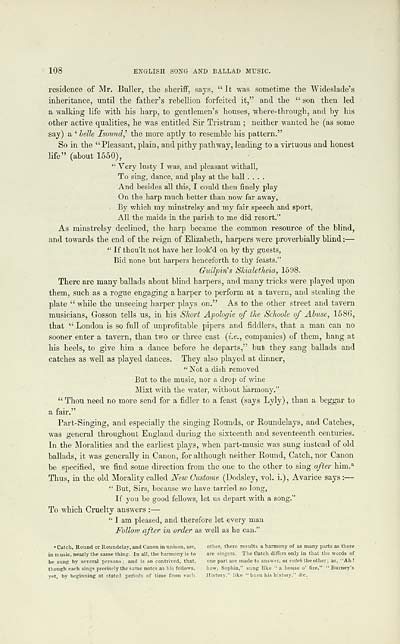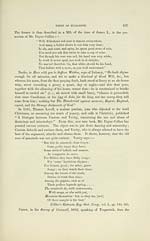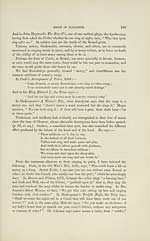Glen Collection of printed music > Printed text > Popular music of the olden time > Volume 1
(142) Page 108
Download files
Complete book:
Individual page:
Thumbnail gallery: Grid view | List view

108 ENGLISH SONG AND BALLAD MUSIC.
residence of Mr. Buller, tlie sheriff, says, "It was sometime the Wideslade's
inheritance, until the father's rebellion forfeited it," and the " son then led
a walking life with his harp, to gentlemen's houses, where-through, and by his
other active qualities, he was entitled Sir Tristram ; neither wanted he (as some
say) a ' helle Isound^ the more aptly to resemble his pattern."
So in the "Pleasant, plain, and pithy pathway, leading to a virtuous and honest
life" (about 1550),
" Very lusty I was, and pleasant withall.
To sing, dance, and play at the ball ....
And besides all this, I could then finely play
On the harp much better than now far away,
By which my minstrelsy and my fair speech and sport,
All the maids in the parish to me did resort."
As minstrelsy declined, the harp became the common resource of the blind,
and towards the end of the reign of Elizabeth, harpers were proverbially blind : —
" If thou'lt not have her look'd on by thy guests,
Bid none but harpers henceforth to thy feasts."
Guilpin's Sldaletheia, 1598.
There are many ballads about blind harpers, and many tricks were played upon
them, such as a rogue engaging a harper to perform at a tavern, and stealing the
plate " while the unseeing harper plays on." As to the other street and tavern
musicians, Gosson tells us, in his Short Apologie of the Schoole of Aluse, 1586,
that " London is so full of unprofitable pipers and fiddlers, that a man can no
sooner enter a tavern, than two or three cast (i.e., companies) of them, hang at
his heels, to give him a dance before he departs," but they sang ballads and
catches as well as played dances. They also played at dinner,
" Not a dish removed
But to the music, nor a drop of wine
Mixt with the water, without harmony."
" Thou need no more send for a fidler to a feast (says Lyly), than a beggar to
a fair."
Part-Singing, and especially the singing Eounds, or Roundelays, and Catches,
was general throughout England dm-ing the sixteenth and seventeenth centuries.
In the Moralities and the earliest plays, when part-music was sung instead of old
ballads, it was generally in Canon, for although neither Round, Catch, nor Canon
be specified, we find some direction from the one to the other to sing after him.''
Thus, in the old Morality called JVew Oustome (Dodsley, vol. i.) , Avarice says : —
" But, Sirs, because we have tarried so long,
If you be good fellows, let us depart with a song."
To which Cruelty answers : —
" I am pleased, and therefore let every man
Follow after in order as well as he can."
• Catch, Round or Roundelay, and Canon in unison, are, other, tfiere results a harmony of as many parts as there
in music, nearly the same thing. In all, the harmony is to are singers. The Oatoh differs only in that the words of
be sung by several persons; and is so contrived, that, one part are made to answer, or cflVcA the other ; as, "Ah!
though each sings precisely the same notes as his fellows, liow, Sophia," sung like " a house o' tire," " Buraey's
yet, by beginning at stated periods of time from each History," like " burn his history," &c.
residence of Mr. Buller, tlie sheriff, says, "It was sometime the Wideslade's
inheritance, until the father's rebellion forfeited it," and the " son then led
a walking life with his harp, to gentlemen's houses, where-through, and by his
other active qualities, he was entitled Sir Tristram ; neither wanted he (as some
say) a ' helle Isound^ the more aptly to resemble his pattern."
So in the "Pleasant, plain, and pithy pathway, leading to a virtuous and honest
life" (about 1550),
" Very lusty I was, and pleasant withall.
To sing, dance, and play at the ball ....
And besides all this, I could then finely play
On the harp much better than now far away,
By which my minstrelsy and my fair speech and sport,
All the maids in the parish to me did resort."
As minstrelsy declined, the harp became the common resource of the blind,
and towards the end of the reign of Elizabeth, harpers were proverbially blind : —
" If thou'lt not have her look'd on by thy guests,
Bid none but harpers henceforth to thy feasts."
Guilpin's Sldaletheia, 1598.
There are many ballads about blind harpers, and many tricks were played upon
them, such as a rogue engaging a harper to perform at a tavern, and stealing the
plate " while the unseeing harper plays on." As to the other street and tavern
musicians, Gosson tells us, in his Short Apologie of the Schoole of Aluse, 1586,
that " London is so full of unprofitable pipers and fiddlers, that a man can no
sooner enter a tavern, than two or three cast (i.e., companies) of them, hang at
his heels, to give him a dance before he departs," but they sang ballads and
catches as well as played dances. They also played at dinner,
" Not a dish removed
But to the music, nor a drop of wine
Mixt with the water, without harmony."
" Thou need no more send for a fidler to a feast (says Lyly), than a beggar to
a fair."
Part-Singing, and especially the singing Eounds, or Roundelays, and Catches,
was general throughout England dm-ing the sixteenth and seventeenth centuries.
In the Moralities and the earliest plays, when part-music was sung instead of old
ballads, it was generally in Canon, for although neither Round, Catch, nor Canon
be specified, we find some direction from the one to the other to sing after him.''
Thus, in the old Morality called JVew Oustome (Dodsley, vol. i.) , Avarice says : —
" But, Sirs, because we have tarried so long,
If you be good fellows, let us depart with a song."
To which Cruelty answers : —
" I am pleased, and therefore let every man
Follow after in order as well as he can."
• Catch, Round or Roundelay, and Canon in unison, are, other, tfiere results a harmony of as many parts as there
in music, nearly the same thing. In all, the harmony is to are singers. The Oatoh differs only in that the words of
be sung by several persons; and is so contrived, that, one part are made to answer, or cflVcA the other ; as, "Ah!
though each sings precisely the same notes as his fellows, liow, Sophia," sung like " a house o' tire," " Buraey's
yet, by beginning at stated periods of time from each History," like " burn his history," &c.
Set display mode to: Large image | Transcription
Images and transcriptions on this page, including medium image downloads, may be used under the Creative Commons Attribution 4.0 International Licence unless otherwise stated. ![]()
| Special collections of printed music > Glen Collection of printed music > Printed text > Popular music of the olden time > Volume 1 > (142) Page 108 |
|---|
| Permanent URL | https://digital.nls.uk/91369151 |
|---|
| Shelfmark | Glen.254 |
|---|---|
| Additional NLS resources: | |
| Attribution and copyright: |
|
| Description | Scottish songs and music of the 18th and early 19th centuries, including music for the Highland bagpipe. These are selected items from the collection of John Glen (1833 to 1904). Also includes a few manuscripts, some treatises, and other books on the subject. |
|---|
| Description | The Glen Collection and the Inglis Collection represent mainly 18th and 19th century Scottish music, including Scottish songs. The collections of Berlioz and Verdi collected by bibliographer Cecil Hopkinson contain contemporary and later editions of the works of the two composers Berlioz and Verdi. |
|---|

